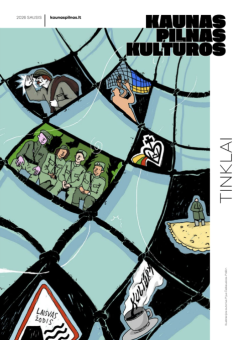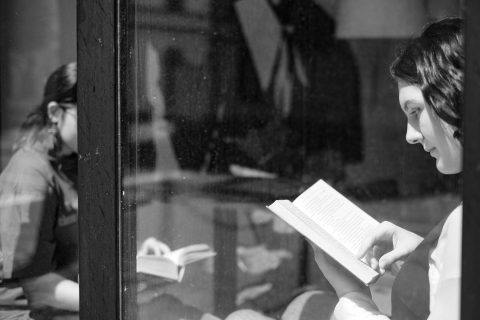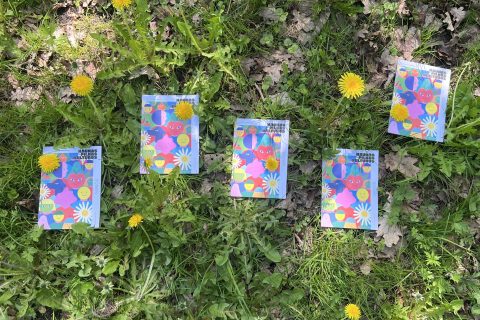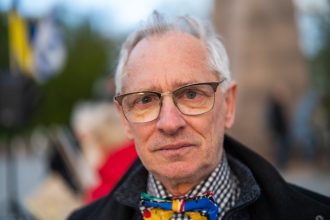In the last five years, Kaunas has become a real capital of festivals. Some of those events happened only once, in the context of the Kaunas – European Capital of Culture 2022 project, while others grew and became a separate body. Among them is the Kaunas Literature Week, which will take place in the city on May 8–12. This year, the event will be held for the fourth time and will include literary evenings, traditional readings, meetings with writers, dates with a book, and new initiatives. I talked about the organizational processes, moods, and difficulties with the main organizers of the festival: Laurynas Katkus and Rūta Eidukevičienė.
Laurynas, and Rūta, how do you both feel while waiting for the festival?
Laurynas: We live intensively, waiting. Our baby – the festival we have been preparing for a year – will soon see the light of day, so we are very curious to see how it will be received.
Rūta: I feel the same way. We live happily, although there are many worries. The closer to the festival the more unexpected things happen. That’s why it is great that we have a wonderful team. Little by little new people are joining, and new ideas and points of view are emerging. I am glad to know that the festival will take place at all. There were hesitations but we feel a duty both to our visitors and our partners.
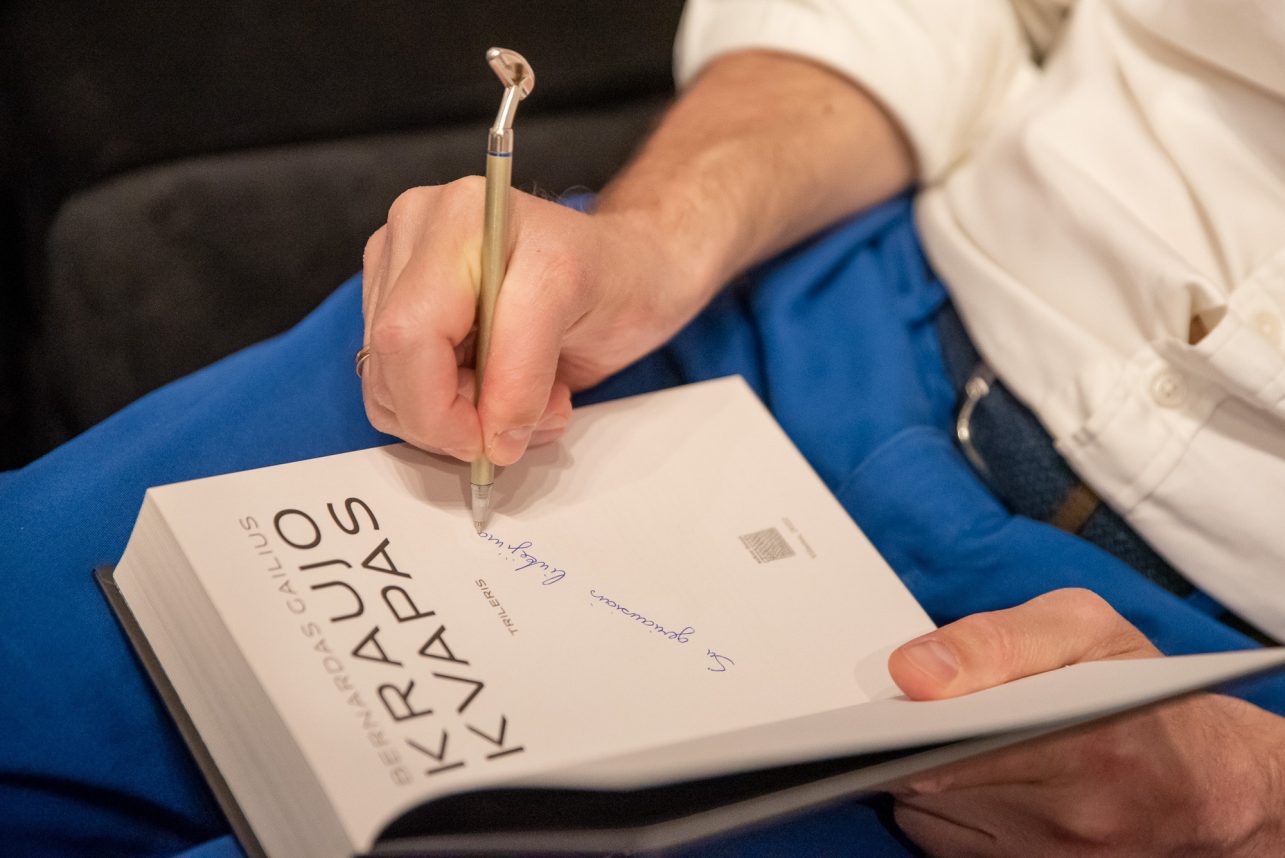
Before the first Literary Week, you were interviewed by my colleague. You mentioned that Kaunas did not have its literature festival, so you decided to fix that. What were your first times?
Rūta: We had an idea first and then we immediately started to work on fixing that gap. We were a little naive, we expected everything to be simpler. Of course, 2021 was a year of huge challenges, the height of the pandemic. If I am not mistaken, the opening of the festival took place the day after public events were allowed. You can imagine how we felt waiting for the opening, not knowing exactly what we would be able to do or if we would be able to do it at all. There were also political challenges – unrest started in Belarus, and we had a guest from there. He flew home on the last flight. We couldn’t even imagine what would happen a year later… A war in Ukraine started when we were organizing the second festival.
Laurynas: Sometimes such events take you where you didn’t expect to be. For example, the beginning of Russian aggression in Ukraine brought us together with Ukrainian writers. We were probably the first to invite them to Lithuania when the war started. That connection remains to this day, not only in the literary plane but also in carrying aid to their country. This shows that the festival is not some formal table whose columns must be filled. It is a living organism that reacts to what is happening in Lithuania and the world.
Rūta: It is probably natural that the festival’s first year was a year of searching. Laurynas is a writer and a translator, who has visited various literary festivals abroad, so we were able to draw on his experience. We searched a lot and tried things out, and during the second festival, we gave some things up. Now we have some new ideas. For example, the discussion forum for writers, which we organize together with the Goethe Institute. It is our main partner and sponsor this year.
Laurynas: I would say that a certain core audience has formed since the first festival. Of course, it varies depending on the author and the topic, but I can safely say that the majority is made up of middle-aged and older people. Rūta and I belong to the middle generation, so it is not surprising that our literary tastes mostly correspond to the tastes of this generation.
We have an interesting situation regarding youth. They willingly go to readings organized specifically for them – Atviras mikrafas (Open Mic) or Nauji vėjai (New Winds) – but rarely come to other events. You would think that young people, who write, should be interested in contemporary literature, famous and new names. I hope that will be the case in the future.
Rūta: In 2022, the festival program was longer; after all, it was the year of Kaunas – the European Capital of Culture. Probably the festival grew not because of the spring events, but because we also had its second part in the fall. The autumn program included Šeteniai readings that featured Ukrainian Yuri Andruchovych with a text written specifically for this meeting right after Russia invaded Ukraine and Svetlana Aleksievich, winner of the Nobel Prize for Literature from Belarus.
Let’s talk about the present. The organizers of many activities born during the Kaunas 2022 project later encountered the indifference of the financing institutions. Were you affected by that too?
Rūta: I would say that we were not affected by the end of the Kaunas 2022 project, but by the fact that the general situation is simply more difficult this year. We did not receive the support of the Lithuanian Council for Culture, so we had to think about how to adjust the program and adapt everything to the situation we were in, knowing that we could no longer refuse some events.
We had to widen our search for partners and sponsors. We are very glad for the connections with the Goethe Institute, which contributed to the festival financially as well as ideologically. Of course, we also received support from Kaunas City Municipality. The goal for the future is to find more sponsors from the private sector who would see the meaning and benefits of the festival for the city.
Laurynas: It seems to me that all literary events in Lithuania that want to have a larger international program and invite well-known authors face the same challenge – the usual limit of support from the Council for Culture or the municipality. In addition, it is not acceptable in Lithuania to pay for literary readings, unlike concerts or movie screenings. Therefore, we do not have an additional source of finance.

What do you think are the reasons for this? Even before the first festival, you mentioned that you wanted to present lively, contemporary literature and texts written in different languages from different countries. Perhaps there is no need for Literature Week and the aforementioned topics in Kaunas after all?
Laurynas: There is definitely a need. We have our audience, although, of course, we always want the circle to be even wider. One more thing: the contemporary writers we bring to the festival very rarely visit Kaunas and Lithuania in general. Meeting the author is a unique way to get to know both the writer’s work and their person.
Rūta: Conversations with authors are very important to us. In addition to texts, we want to present the authors and their personalities. For this reason, we carefully select moderators who can engage in sincere conversations and talk about a wide variety of topics, including current events or challenges and issues related to our common humanity. This year’s international writers’ discussion forum will be moderated by Eglė Murauskaitė, one of the most experienced security specialists in Lithuania, a researcher at the University of Maryland (USA), and the guest from Argentina, Mariana Enriquez, will be interviewed by the associate professor at Wellesley College in Boston, teacher of Latin American literature and culture, translator, and writer Dr. Evelina Gužauskytė. There will be more unexpected and intriguing encounters.
I would like to talk about the phenomenon of the Vilnius Book Fair. Did it not occur to you that it is enough for the average reader to visit the fare once a year, thus making it more difficult for them to attend other similar events later?
Laurynas: The phenomenon of the book fair covers more than fiction and even more than a book. I am glad that people are used to visiting it. For many, especially young people, this is the first acquaintance, the first step into the literary world.
We see Kaunas Literature Week as a second step. If the book fair provides you with general information about authors and book news, our festival allows you to continue to extend your acquaintance more slowly and thoroughly. Especially since there are no such obstacles as queues, traffic jams, several events taking place at the same time, and the like. And finally, the people of Kaunas do not need to go to Vilnius, everything happens in the very center of the city.
In addition to organizing serious readings and discussions, we also have events that shape the culture of communication among readers, for example, the Sunday brunch at the Godo cafe and Knygų laisvė, where you can find a book, you read a long time ago or some new interesting one at second-hand booksellers and independent publishers stands.
Rūta: And let’s not forget the friends’ program, due to which the festival’s events spread out widely around the city. Our partners – libraries, and museums – are involved in it. I sometimes hear that when some organization in Kaunas has an interesting idea related to literature and books, it decides to wait for spring to implement it during Literature Week.
Share the highlights of this year’s program.
Laurynas: The program consists of several parts. The Lithuanian part will have meetings with Undinė Radzevičiūtė and Mantas Adomėnas. Also, one evening will be dedicated to writers from Kaunas and based in the city. This year, the traditional part of the event Leavers and Locals will feature poets Gvidas Latakas, winner of the Jotvingiai Prize, and Artūras Valionis. We want to show that the city’s literary field is much broader than we think. We all know Kaunas writers of the older generation. Our goal is to present the younger ones, who do not necessarily live in Kaunas but have grown up and formed here.
In the foreign writers’ part, we will have a guest from Latin America – a striking and provocative author – Mariana Enriquez. By the way, Kaunas Literature Week is the first stop of her big tour of literary festivals in Northern and Western Europe. Fans of Scandinavian literature are invited to come and meet the prominent Icelandic prose writer Auður Ava Ólafsdóttir. Julia Fiedorczuk, an author culturally similar and appreciated by Lithuanians, will visit us from Poland. And if you like poetry, I recommend the evening of German poet Hans Thill and Ukrainian poet and soldier Jaryna Chornohuz, which will honor the power of poetry to connect people and languages.
What are you currently reading?
Laurynas: The latest books I’ve read were for the Literature Week club. There we talked about Mantas Adomėnas’ book Moneta & labirintas (The Coin and the Labyrinth), Alvydas Šlepikas’ Namas anapus upės (A House Across the River) and J. M. Coetzee’s The Pole.
Ruta: I believe I won’t surprise anyone. I am currently reading Pavojingi žodžiai (Dangerous Words) by Undinė Radzevičiūtė, who is one of my favorite writers. The novel will become one of the highlights of the festival’s opening event. The writer is a master of words, so I highly recommend coming to the event, getting acquainted, and, of course, reading the book.
